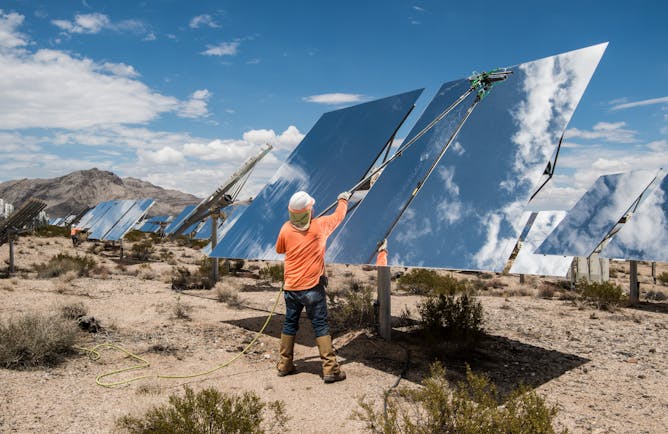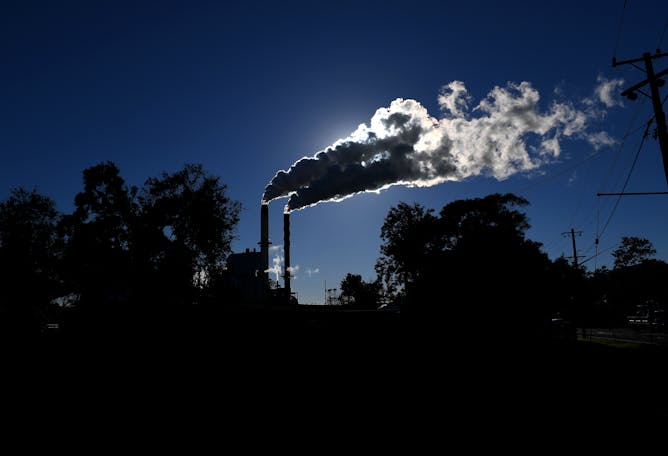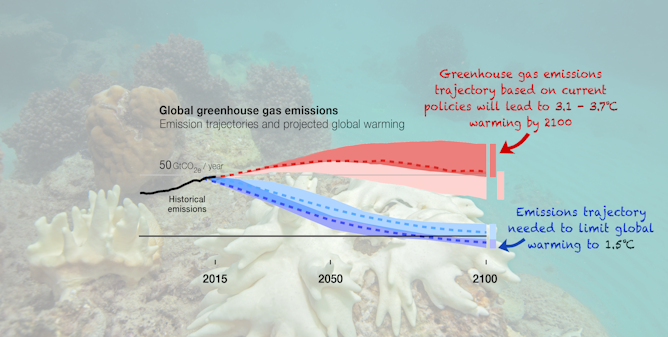|
|
|
Editor's note
|
|
Ever since the Paris climate agreement was forged in 2015, questions have swirled around the feasibility of its ambitious goal to limit global warming to 1.5C. Now we have the answers, courtesy of a keenly awaited report from the Intergovernmental Panel on Climate Change. It concludes that the goal is still just within reach, albeit with a ‘transformational’ effort to cut emissions to net zero by the middle of this century.
It’s a daunting task, but one well worth pursuing. As Mark Howden and Rebecca Colvin write, millions will be spared the ravages that would ensue if we allowed global warming to creep to 2 degrees instead of 1.5. Meanwhile, Iain Stewart examines Australia’s share of the effort, and says we have just two decades to adopt a low-carbon economy. And you can check out more details of the report in our at-a-glance infographic.
|
Michael Hopkin
Section Editor: Energy + Environment
|

|
|
Top story
|

National Renewable Energy Lab/Flickr
Mark Howden, Australian National University; Rebecca Colvin, Australian National University
Limiting global warming to 1.5C is a tough challenge but still within reach, according to a landmark report from the Intergovernmental Panel on Climate Change commissioned after the 2015 Paris summit.
|

Australia has just two decades to put itself on the path to zero greenhouse emissions.
AAP Image/Dave Hunt
Iain Stewart, ClimateWorks Australia
The world needs to be carbon-neutral by mid-century to give ourselves a chance of holding global warming to 1.5C. With around 1% of the global carbon budget, Australia needs to rapidly do its share.
|

Limiting global warming 1.5℃ will be profoundly challenging given current policies.
Chart data: Climate Action Tracker / Image: AAP
Michael Hopkin, The Conversation; Emil Jeyaratnam, The Conversation; Madeleine De Gabriele, The Conversation
Here are the essential facts from the UN's special report on climate change.
|
Science + Technology
|
-
Rob Nicholls, UNSW
If you check a website multiple times for a flight on a specific date, the seller might assume this is the only date you're interested in and increase the price on offer.
-
Martin White, University of Adelaide
Jodie Whittaker finally takes over as the first woman to play the Doctor in the long-running TV series. But that's not all that's new as the show make a welcome return to our screens.
|
|
Politics + Society
|
-
Tania Penovic, Monash University; Caroline Henckels, Monash University; Ronli Sifris, Monash University
A challenge in the High Court, starting today, will argue that "safe access zones" around abortion clinics impede the constitutional right to freedom of political speech. Here's why that's wrong.
-
James Laurenceson, University of Technology Sydney
China is one of the world's largest economies, and Deng Xiaoping was arguably the man who made that happen through his visions of economic reform.
|
|
Education
|
-
Lionel Page, Queensland University of Technology; Dipanwita Sarkar, Queensland University of Technology; Juliana Silva Goncalves, Queensland University of Technology
The reason isn't your astrological sign, but rather the role your birth date plays in deciding when you enter school. Children who are older than their peers in school tend to do better.
|
|
Business + Economy
|
-
Eugene Schofield-Georgeson, University of Technology Sydney
Labor wants to require Australia's big companies to report the ratio of their chief executive's pay to their workers' pay. While it might embarrass some, there's no evidence it would make them pay their workers more.
|
|
Health + Medicine
|
-
Lila Landowski, University of Tasmania
With an ageing population, dementia is becoming more and more prevalent. But what does dementia actually do to the brain to cause changes in behaviour?
-
Ian Musgrave, University of Adelaide
A US court recently ruled the weed killer Roundup contributed to a former gardener's cancer. Juries don't decide science. The weight of evidence shows Roundup has little association with cancer.
|
|
Arts + Culture
|
-
Ari Mattes, University of Notre Dame Australia
Venom is an engrossing science fiction film, which balances intense action sequences with disarming humour. Viewing it in 4DX, however, did not add to the experience.
-
Sandra D'urso, University of Melbourne
This production, a collaboration with local theatre artists, stages a public debate hosted by the (made up) Melbourne Trust Forum. It unfolds as part media reportage and part gameshow.
-
Sarah Balkin, University of Melbourne
Samuel Beckett wrote Watt while hiding from the Gestapo during the second world war. It describes Watt’s journey to, within, and away from Mr Knott’s house, where Watt lives for some time as a servant.
-
Mandy Stefanakis, Deakin University
Some of Australia's finest songwriters joined members of the Go-Betweens to mark the 30th anniversary of a seminal album.
|
|
| |
Featured jobs
|

|
Swinburne University of Technology — Hawthorn, Victoria
|

|
RMIT University — Melbourne, Victoria
|

|
Charles Sturt University — Wagga Wagga, New South Wales
|

|
University of Melbourne — Parkville, Victoria
|
|
|
|
Featured events
|

|
Hilton Hotel - Brisbane; Mural Hall - Melbourne; Doltone House Hyde Park - Sydney; National Museum of Australia - Canberra, Brisbane, Melbourne, Sydney, Canberra, New South Wales, 2000, Australia — The Institute of Managers and Leaders
|

|
University of Sydney, Sydney, New South Wales, 2006, Australia — University of Sydney
|

|
University of Sydney, Sydney, New South Wales, 2006, Australia — University of Sydney
|

|
Deakin Downtown, Level 12, Tower 2, Collins Square, 727 Collins Street, Docklands, Melbourne, Victoria, 3008, Australia — Deakin University
|
|
|
|
| |
| |
| |
| |
| |
|
|
|
|
|
|
|